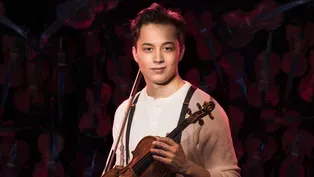This Is Minnesota Orchestra
Musician Portrait: Gabriel Campos Zamora
Clip: Season 7 Episode 2 | 9m 16sVideo has Closed Captions
Costa Rican Principal Clarinet Gabriel Campos Zamora challenges himself in Minneapolis.
Principal Clarinet Gabriel Campos Zamora left his home in Costa Rica as a teen to study in the US at the Interlochen Center for the Arts. Today, he finds connection off stage with his wife violinist Sabrina Bradford, their dogs and his team of international soccer mates. Thank you to Lauren B. Photography, Ninth Street Minneapolis and Twin Cities Obedience Training Club.
Problems with Closed Captions? Closed Captioning Feedback
Problems with Closed Captions? Closed Captioning Feedback
This Is Minnesota Orchestra is a local public television program presented by TPT
This Is Minnesota Orchestra
Musician Portrait: Gabriel Campos Zamora
Clip: Season 7 Episode 2 | 9m 16sVideo has Closed Captions
Principal Clarinet Gabriel Campos Zamora left his home in Costa Rica as a teen to study in the US at the Interlochen Center for the Arts. Today, he finds connection off stage with his wife violinist Sabrina Bradford, their dogs and his team of international soccer mates. Thank you to Lauren B. Photography, Ninth Street Minneapolis and Twin Cities Obedience Training Club.
Problems with Closed Captions? Closed Captioning Feedback
How to Watch This Is Minnesota Orchestra
This Is Minnesota Orchestra is available to stream on pbs.org and the free PBS App, available on iPhone, Apple TV, Android TV, Android smartphones, Amazon Fire TV, Amazon Fire Tablet, Roku, Samsung Smart TV, and Vizio.
Providing Support for PBS.org
Learn Moreabout PBS online sponsorship(slow clarinet music) - The clarinet is a very versatile instrument in terms of its range, and it's quite old.
You start seeing the clarinet as early as Haydn, and the sound glues really well with different sections of the orchestra.
It plays beautifully well with the strings.
It's an incredibly soloistic instrument.
It can be very virtuosic and also lyrical, which is probably why a lot of amazing composers picked the clarinet to be the main voice of so many of their solos.
It's a prominent voice in the woodwind section for sure.
My name is Gabriel Campos Zamora, and I'm the principal clarinet of the Minnesota Orchestra.
I was born in San Jose, Costa Rica, grew up there until I was about 10.
At that point, we moved to the province of Alajuela to a small town named La Asuncion de Belen.
♪ Blue sky ♪ - My parents, they were jazz musicians.
They had a group called the Jazz Garbo.
My mother was the singer of the group, and my father was the drummer.
(dreamy upbeat music) The music system is a little bit different in Costa Rica.
If you wanna study music, which my parents wanted me to study formally, you have to enroll in an after-hours program.
So I studied at the conservatory since I was seven.
(gentle clarinet music) Eventually, I would start studying with the beloved Jose Manuel Ugalde Quiros, but we had a nickname for him which was Cheche, and he was the third and bass clarinet of the national symphony.
And then tragedy struck.
He was murdered.
He was shot on the street, presumably because the assailants wanted to take away his clarinet bag.
And that was a traumatic experience for me personally but also for the musical community because he was a really well respected and loved colleague.
I remember they had a really powerful concert in his memory.
(plaintive orchestral music) It became clear to me that I wanted to pursue clarinet in a more serious way.
Lots of students had attended the Interlochen Arts Academy as a way to come to the United States, and I figured that that would be a way to come to study with a teacher named Nathan Williams.
One of the loveliest things was support for international students.
I was very lucky to have a scholarship, which helped me get my first set of instruments.
Beyond that, I had an incredible group of people, host families, individuals who believed in my talent, and that was very, very special, very powerful.
I went to study at the Colburn School in LA with Professor Yehuda Gilad, who was my teacher and mentor for the next four years.
I ended up at a fellowship in New York City, a Carnegie Hall program.
And that was a steep learning curve, you know, being a student in a small conservatory to all of a sudden being a freelancer in New York City of all places.
And then in 2016, I came to audition for the Minnesota Orchestra.
So after completing my trial weeks with the Minnesota Orchestra, I was offered the position of principal clarinet.
I was happy to take the challenge, and I was offered a lot of positive criticism that helped me develop in the role that I have today.
(enchanting orchestral music) We do have a rather resonant and large space, and the criticism had to do with finding ways to really fill the hall with sound, particularly during solos.
And that is something that takes time, that takes a little bit of experimenting.
You have to experiment with instruments, with your reeds, with how you project, with how you produce sound.
And it's not done overnight, for sure.
(gentle upbeat orchestral music) I couldn't ask for a better section.
They're people you can trust, that you can talk to.
They're supportive.
They're also very, very much down to earth.
- I came to Minnesota on a one-year contract in the '21-'22 season, and Gabby was actually one of the first friends I made here in the orchestra.
It's because we had so much in common, not only the music, not only working in the same place, but our love of dogs, our love of food and travel, and our shared Latin American heritage.
My family's from Guatemala.
- [Gabriel] We got married on a Saturday, June 29th of 2024, newlyweds.
- Yes.
And when we decided that we were gonna get married, I was like, okay, well, you know, this is it.
Like, if I want to settle down here, if I'm planning on settling down here and, you know, making a life, I wanna be able to contribute in a substantial way.
And it was just a fortunate timing that there was an audition coming up around the same time.
And actually, I found out that I got the job and that I'd passed my trial the same week that we got married.
- You know, this feeling of sprouting roots somewhere, it's still relatively new to me, and I wonder if that has to do with the fact that I am an immigrant.
I certainly miss home in that way.
I miss the food.
I miss my language.
But I'm also very happy here.
Minneapolis is a fantastic place to live, and I want to retain my language and my customs and my ties to my home country while also developing a life in the country that I currently live in.
(boisterous orchestral music) I am not an athlete by any stretch of the imagination, but I do play soccer with some pretty good players.
And the way I improve my moves on the soccer pitch is by applying some music techniques as far as practicing is concerned.
Why I think it's so important to have challenging activities outside of music is to be reminded that there's always room to grow and to be challenged in your own music.
So in this team, sometimes we joke that we are a UN delegation because we have guys from all over the world.
I'm from Costa Rica.
- I am from Spain.
- Nigeria.
- I'm from Argentina.
- I'm from Chicago.
(laughs) - Thank you guys, thank you.
Appreciate it.
(players shouting in foreign language) (upbeat orchestral music) (player clapping) - Dog training is a humbling experience also, and it teaches you that there's always more to learn.
You can't really overwhelm them with repetition, and, instead, you have to really be careful about how much you work.
Praise them and reward when your puppy does what you want them to do, even if it's a simple task.
Yee!
I've learned that sometimes in my playing, I need to apply the same sort of mentality that instead of getting frustrated, sometimes the best thing to do is put it away for a few hours, go do something else, and then come back to it later.
I often find that when I do that, it actually works better when you come back.
(pensive orchestral music) For me, as a person, it's really important that I continue to challenge myself to grow so I can continue to be a better colleague, a better husband, to be a better human being, to be a better musician.
Søndergård Conducts Nordic Soundscapes | Preview
Thomas Søndergård conducts Carl Neilsen's Violin Concerto featuring Johan Dalene. (30s)
Video has Closed Captions
Orchestra musicians describe places, sounds and experiences that feel like home in winter. (3m 29s)
Providing Support for PBS.org
Learn Moreabout PBS online sponsorshipThis Is Minnesota Orchestra is a local public television program presented by TPT













